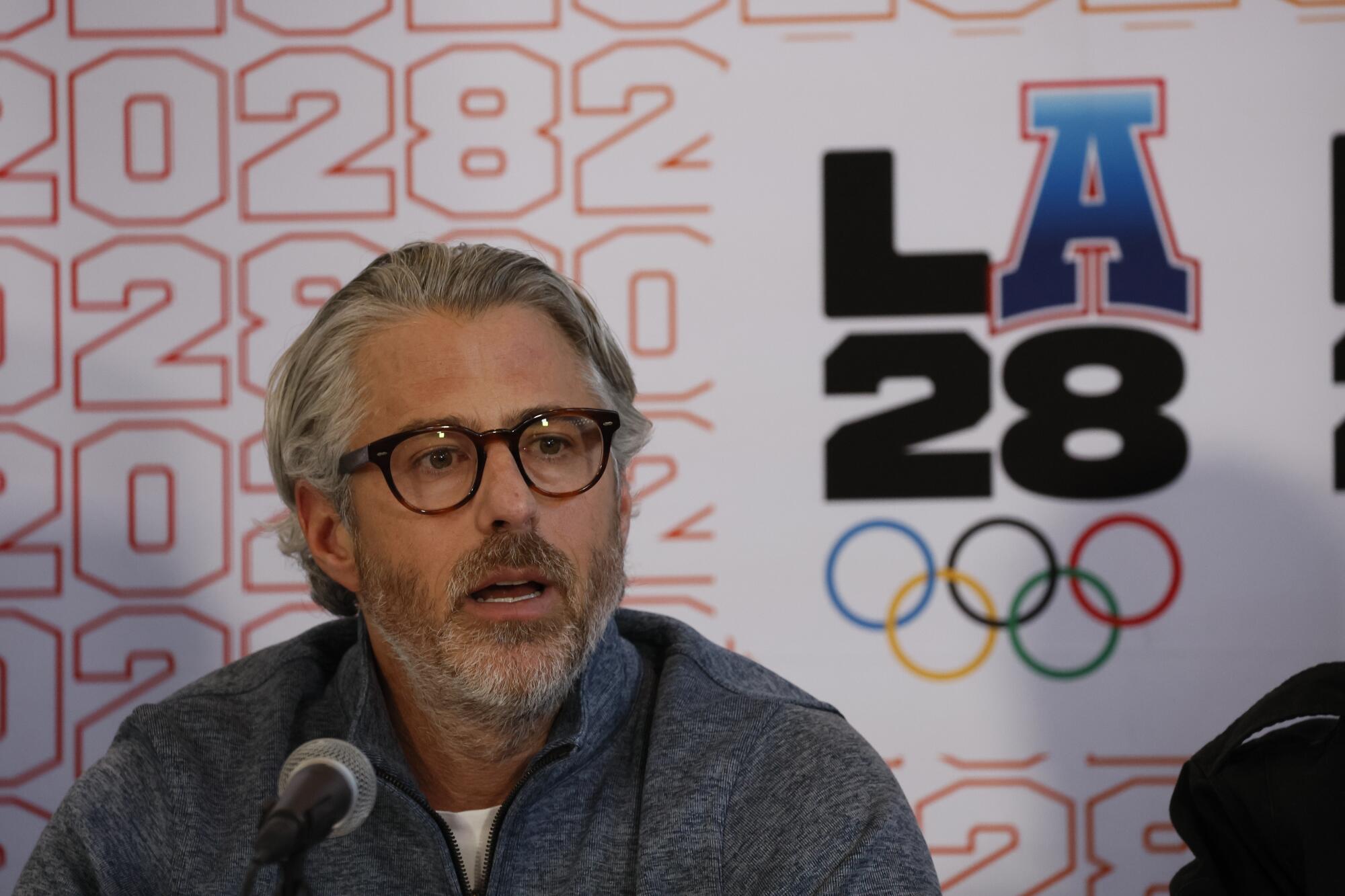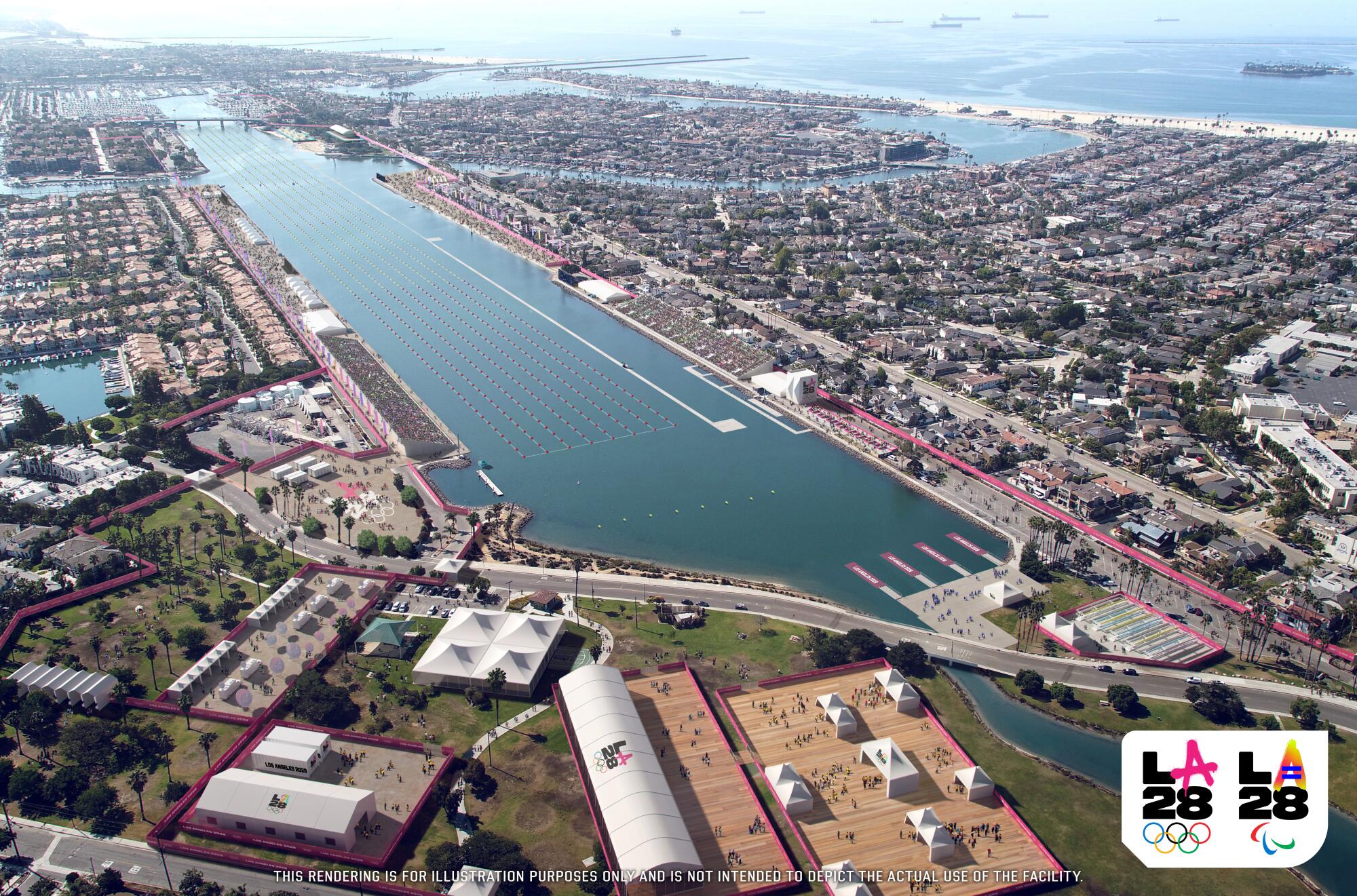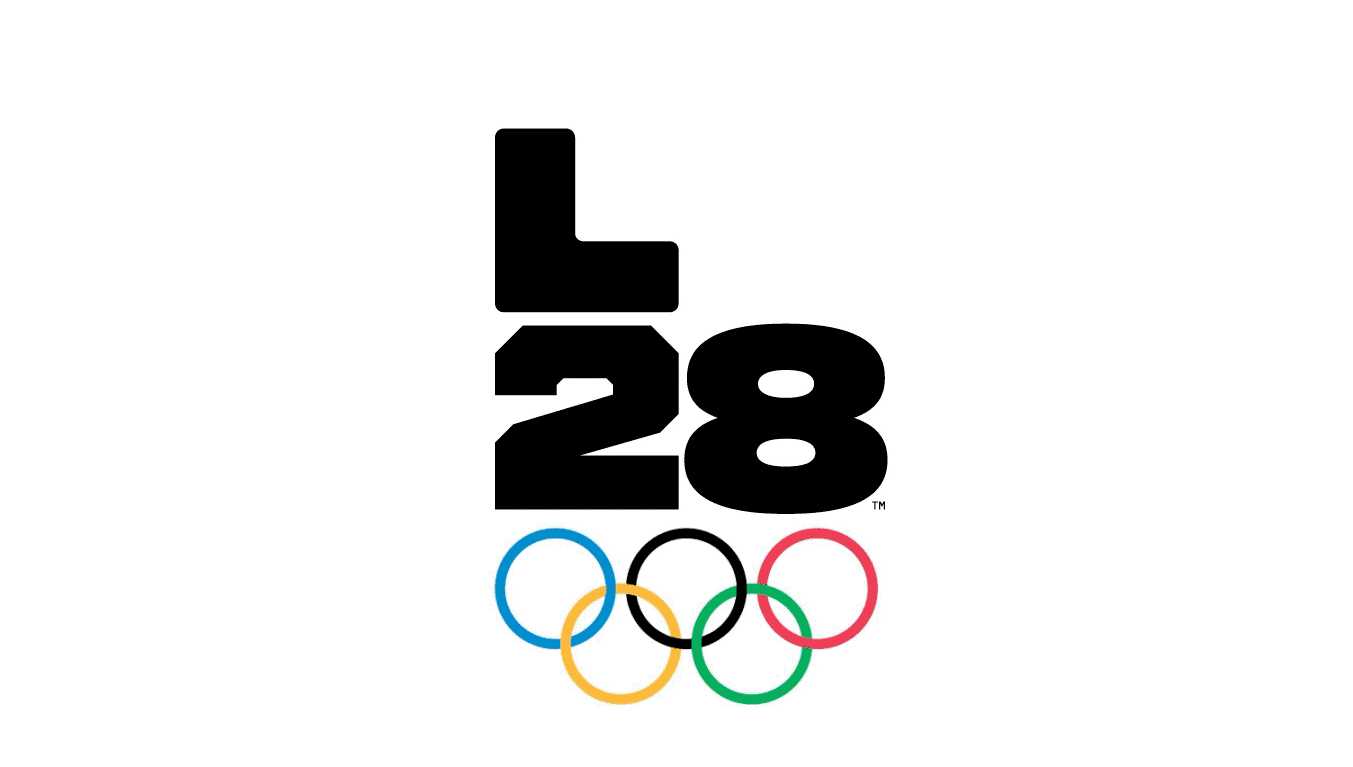
- Share via
- Los Angeles Olympics organizers believe they are on track to meet or exceed their corporate fundraising goals in an effort to ensure public funding will not be needed to pay for the Games.
- LA28 organizers aren’t concerned about visa issues and travel bans preventing athletes from competing.
- LA28 chairman Casey Wasserman says taxpayers shouldn’t be worried they will be handed a bill for the 2028 Olympics.
Three years before the Olympics, LA28 organizers gave International Olympic Committee officials the kind of Games preview that even Hollywood’s best scriptwriters couldn’t plan.
To begin a visit to check on LA28’s planning progress, the IOC coordination commission attended a game at Dodger Stadium and watched Freddie Freeman hit a walk-off double in the 10th inning to defeat the New York Mets in the same stadium that will host Olympic baseball in three years.
The electric celebration, passing grades for an advanced venue plan and a growing corporate sponsorship portfolio keeps LA28 on track approaching the three-year mark until the 2028 Olympics open in a dual-venue ceremony at SoFi Stadium and the Coliseum.
Allyson Felix, Gabby Douglas and Billie Eilish are among the athletes, artists and celebrities who have created logos for the 2028 L.A. Olympics.
“We are really confident in the progress we’ve made,” LA28 chairman Casey Wasserman said after the coordination committee’s three-day visit. “We’re focused on what we’ve always done to deliver the greatest Games we are capable of delivering in this city in the most fiscally responsible way that pays dividends for every member of our Olympic movement and our community.”
With the city of Los Angeles facing deep financial problems and transportation updates lagging behind schedule, LA28 is under pressure to deliver a completely privately funded Games. The private group says it remains up to the challenge as fundraising for the L.A. Games has been “going gangbusters,” John Slusher, chief executive of LA28’s commercial operation, said in an interview with The Times.
With six new partnerships this year — matching the total number of deals in all of last year — LA28 has contract revenue worth more than 60% of its total $2.5 billion sponsorship goal. Slusher expects an estimated seven to nine more deals coming this year, and the group is on pace to reach its goal of $2 billion in corporate sponsorship dollars by the end of the year, Slusher and Wassserman said.
“I would tell you where I’m sitting today, we feel very confident we can either meet or exceed that $2.5 billion target,” Slusher said, “which I think people would have called a stretch target in November.”
A major partnership with Honda signaled a boon for business as it was the first founding-level partnership for LA28 since Salesforce signed on in 2021. The cloud-based software company backed out of its deal in 2024. The sudden split raised eyebrows about LA28’s fundraising progress, casting doubt whether the committee could fulfill a promise of a privately funded Games that shielded local and state taxpayers from picking up any debt.
But organizers remained undeterred.
The organizers of the Los Angeles Olympic Games reveal many of the venues for the 2028 Paralympics, with Los Angeles, Long Beach and Carson hosting events.
Such twists have marked LA28’s long-planned Olympic journey. The L.A. Games were awarded in 2017 in a rare dual-city announcement that also placed the 2024 Games in Paris. Instead of the typical seven-year lead-up time, LA28 preached patience through an unprecedented 11-year planning period.
“More time is always better than less time,” Wasserman said in an interview with The Times. “The only negative of selling is there’s more distance between deals, so everyone’s like, ‘You’re not doing well.’ Which is never how we’ve been feeling. … My view is judge us when we get to the startline on how we did on sponsorship revenue.”
Judgment time is creeping ever closer. The Olympic Games will open on July 14, 2028.
Although the city has agreed to cover the first $270 million in debt incurred from the Games if LA28 goes overbudget, Wasserman said organizers don’t intend to come close to the financial backstop.
According to the latest financial report filed to the city in March, LA28 plans to cover the proposed $7.1 billion cost with about one-third of the projected revenue coming from domestic sponsorships and another one-third coming from ticketing and hospitality.
“The caliber of new domestic partnerships this year highlights the power of the Olympic Games to bring people together, create long-term value and reflect growing national engagement with LA28’s vision,” said Nicole Hoevertsz, the IOC coordination commission chair.

To begin the 2025 sponsorship momentum, LA28 announced an official partnership with AECOM in March as the engineering company will support venue infrastructure for the Games.
Mortgage company Pennymac, mattress brand Saatva, cloud-based data storage company Snowflake and aviation company Archer signed on as official supporters, one tier below a partnership such as AECOM.
While not specifying the financial details, Slusher said he estimated LA28 would make three or four times as much sponsorship revenue this year compared with all of last year.
“Our job is to maximize revenue,” Wasserman said. “I am very confident in our ability to generate, frankly, more revenue that’s ever been generated for a Summer Games in the history of the Olympics. I have no doubt about that.”
While a smaller portion of the budget than sponsorship, merchandise and licensing is gaining momentum as well, Slusher said, as companies clamor for a chance to issue official pins, T-shirts, programs or plush toys.
LA28’s financial report states that it has signed commercial or retail agreements with several companies, including Cisco, Dick’s Sporting Goods and Skims. Licensing and merchandising is projected to bring in $344 million, according to LA28’s latest annual report.
Will the Trump administration fix a backlogged visa approval process in time for fans from many countries to attend the World Cup and L.A. Olympics?
The next major piece will be ticketing, which, with hospitality, is slated to generate $2.5 billion in revenue, a $569 million increase from a June 2024 estimate. LA28 expects to begin registration for the ticket lottery in early 2026.
While LA28 and city officials have hailed the Games as a moment to welcome the world to L.A., concerns about international travel have mounted under the current administration. Delays in visa processing prompted Congressional action ahead of next year’s World Cup. President Trump signed a travel ban Wednesday that bars citizens from 12 countries from entering the United States. On Sunday, the Trump administration deployed the National Guard to Los Angeles amid protests over immigration raids.
The latest Trump order targeting visitors from 12 countries includes exemptions for certain athletes, including those traveling to the United States for major sporting events, and Wasserman was not worried about visa issues affecting the Games.
“It’s very clear that the federal government understands that that’s an environment that they will be accommodating and provide for,” Wasserman said of the recent travel ban. “So we have great confidence that that will only continue. It has been the case to date and it will certainly be the case going forward to the Games.”
Because Wasserman anticipates the majority of ticket sales to be domestic, he said he is not concerned with a potential drop in revenue if international fans don’t attend amid visa or safety concerns.
But Paris 2024, which sold a record 12.1 million tickets for the Olympic and Paralympic Games, sold about 38% of its Olympic tickets to fans living outside France, according to the IOC. The successful event exceeded its ticketing and hospitality revenue target by $397 million and brought in a roughly $30-million surplus.
LA28 landed a major partner in Honda, helping its push to secure $2 billion in Los Angeles Olympics sponsorships by the end of 2025.
Continuing the Olympic movement’s success has been at the top of LA28’s mind while bringing the Games back to L.A. for the first time in more than four decades. The 1984 Games were also privately funded and hailed as a massive success for their $225 million surplus that was invested in youth sports. The opportunity to use existing venues in 2028 dramatically reduces potential costs by avoiding new, permanent construction.
“I fully expect that LA28 will be successful in meeting its revenue goals, and I fully expect that the 2028 Olympic and Paralympic Games will be a financial success,” Paul Krekorian, Los Angeles executive director for the office of major events, said in a statement to The Times. “Twice before, Los Angeles has hosted the Olympics, even in the face of adversity, and both of those Games were a huge success for our city and its residents.”
Still, city leaders face enormous pressure to ensure that streets and sidewalks are safe and accessible for the millions of people expected to visit L.A. during the Games. Mayor Karen Bass recently unveiled a citywide initiative called “Shine L.A.” that encourages volunteers to beautify the city with clean-ups and tree plantings ahead of next year’s World Cup and the Olympics.
With city and federal funding, L.A. has planned to overhaul its public transportation system, including a long-awaited Metro station that opened Friday at Los Angeles International Airport. But other updates such as an electrified bus network, expanded rail lines and the LAX people mover have lagged. While the city’s transportation plan is outside of LA28’s Games operation and budget, Wasserman expressed confidence that L.A. will be able to repeat its transit success from the 1984 Games.
But the Olympics have grown larger than ever. A record 11,198 Olympians will compete in 2028. The Paralympics will be the city’s first. Especially with L.A. still recovering from devastating wildfires and a nearly $1 billion deficit, the threat of taxpayers absorbing any costs for the Games looms large.
With financial momentum growing behind the 2028 Games, Wasserman wants to put worried minds at ease.
“The last thing a taxpayer should be worried about is us,” Wasserman said. “We know how to do this. We are proving that every day and we will prove it all the way throughout the process and we are in every sense of the word, giving to the city, not taking from the city.”
More to Read
Go beyond the scoreboard
Get the latest on L.A.'s teams in the daily Sports Report newsletter.
You may occasionally receive promotional content from the Los Angeles Times.










